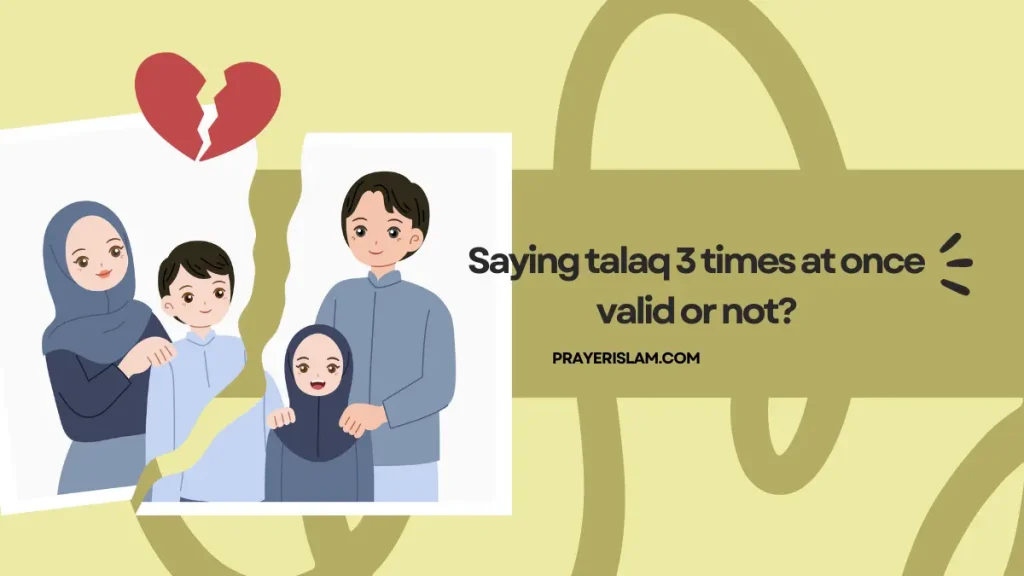The practice of saying talaq (divorce) 3 (three) times at once has been a subject of extensive discussion and interpretation among Islamic scholars. The practice involves a husband declaring divorce to his wife by saying “I divorce you” three times in one sitting or statement. This article explores the different perspectives on this practice, its validity, and the proper method of issuing a divorce according to Islamic teachings.
Types of Triple Talaq
There are three main forms of triple talaq:
- Single Statement Triple Talaq: Saying “I divorce you three times” in one breath.
- Separate Statements in One Sitting: Saying “I divorce you” three times separately but in the same sitting.
- Separate Statements in Different Settings: Issuing three divorces in different settings but within the same menstrual cycle (tuhr).
The Proper Method of Talaq in Sharia
Islamic law prescribes a clear and structured process for divorce to ensure fairness and ample opportunity for reconciliation. The Quran and Hadith provide guidance on the proper method of issuing a divorce:
The Process According to the Quran
In Surah Al-Baqarah (2:229), Allah says:
“Divorce is twice. Then, either keep [her] in an acceptable manner or release [her] with good treatment…”
This verse indicates that divorce should be issued on two separate occasions, with an opportunity for reconciliation after each instance. If reconciliation fails, the third divorce becomes final and binding, prohibiting remarriage unless the wife marries another man and then becomes divorced or widowed.
Surah At-Talaq (65:1) also emphasizes issuing divorce during a period when the wife is not menstruating and ensuring no intimate relations have occurred during this period:
“O Prophet, when you [Muslims] divorce women, divorce them for [the commencement of] their waiting period and keep count of the waiting period, and fear Allah, your Lord…”
The Method Explained in Hadith
The Hadith further clarifies the proper procedure for issuing divorce. In Sahih al-Bukhari, Ibn Umar narrated an instance where he divorced his wife while she was menstruating. The Prophet Muhammad (peace be upon him) instructed him to take her back and wait until she is pure (free from menstruation) before issuing another divorce:
“He (the Prophet) said: Command him to take her back and then divorce her when she is pure or pregnant.” (Sahih al-Bukhari, 5251)
Saying talaq 3 times at once is valid
Among the three forms of triple talaq, the first form—saying “I divorce you 3 (three) times” in one statement—has been a topic of significant scholarly discussion. Some scholars argue that in this case, only one talaq (divorce) is considered valid, based on a consensus (ijma) from the time of the Sahabah (Companions of the Prophet).
Quranic Basis
The Quran states:
“Divorce is twice. Then, either keep [her] in an acceptable manner or release [her] with good treatment…” (Surah Al-Baqarah 2:229)
This verse implies that a second declaration must be made separately after the first. Therefore, if someone says “I divorce you three times” or even “I divorce you ten times” in one go, it should count as only one divorce because the words were uttered in a single instance.
Analogy with Other Practices
To illustrate this point, scholars often use the analogy of praising Allah. If someone is instructed to say “SubhanAllah” (Glory be to Allah) one hundred times and they say, “SubhanAllah one hundred times,” it is not considered as having said “SubhanAllah” one hundred times, but rather as having said it only once. Similarly, saying “I divorce you three times” does not equate to three separate divorces, but to just one.
Scholarly Interpretations on Triple Talaq
The interpretation of saying “talaq” three times at once has varied among scholars. Some argue that this method counts as one divorce, while others consider it to be three separate divorces. Here are some notable perspectives:
Single Statement Triple Talaq as One Divorce
Some scholars, based on the understanding of the Quranic verse and Hadith, argue that declaring “I divorce you three times” in one sitting should be considered as one divorce. They draw parallels with the practice of praising Allah, where saying “SubhanAllah 100 times” is not the same as repeating “SubhanAllah” 100 times individually.
The Stance of Early Caliphs
The Companions of the Prophet, such as Ibn Abbas, narrated that during the Prophet’s time and the early caliphate of Abu Bakr and the first two years of Umar’s caliphate, triple talaq was considered as one:
“In the lifetime of Allah’s Messenger (ﷺ) and Abu Bakr and during the early days of Umar’s caliphate, triple divorce was considered as one.” (Sahih Muslim, 3747)
The Ruling of Caliph Umar
Later, Caliph Umar ibn al-Khattab, observing the misuse of the practice, implemented a ruling to consider it as three divorces to instill discipline among the people. However, this was seen as an administrative decision rather than a change in the Sharia ruling.
Conclusion
The practice of saying “talaq” three times at once remains a debated issue among Islamic scholars. The prevailing opinion among many scholars is that it should be counted as one divorce, based on the practices during the Prophet’s time and the early caliphate. However, for those who follow the ruling of Caliph Umar, it is considered as three divorces.
Regardless of the interpretation, it is crucial to follow the proper method of issuing divorce as prescribed in the Quran and Hadith to ensure justice and the possibility of reconciliation. The structured process not only aligns with Islamic teachings but also upholds the dignity and rights of both spouses.
FAQ
Q1: Is saying “talaq” 3 (three) times in one sitting valid?
A: The validity varies among scholars. Some consider it as one divorce, while others count it as three.
Q2: What is the proper method of issuing talaq?
A: Divorce should be issued during a tuhr (period free from menstruation) without any intimate relations, with a waiting period after each issuance to allow for reconciliation.
Q3: Can a couple remarry after a triple talaq?
A: No, unless the wife marries another man, and then he divorces her or dies.
Q4: Is the practice of triple talaq in one sitting mentioned in the Quran?
A: The Quran prescribes a structured process for divorce, emphasizing fairness and opportunities for reconciliation, but does not explicitly mention the practice of issuing three divorces at once.
Q5: What was the stance of Caliph Umar on triple talaq?
A: Caliph Umar considered triple talaq in one sitting as three to prevent misuse, but this was an administrative decision rather than a change in Sharia law.







